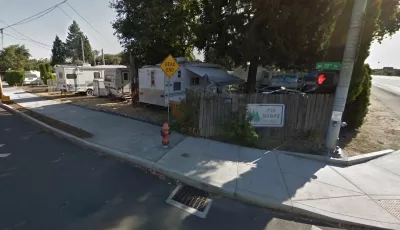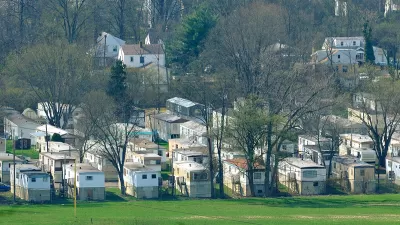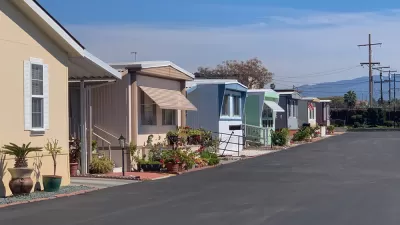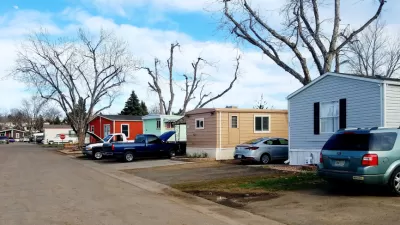The unique construction and ownership structure of so-called 'mobile' homes put their residents at increased risk of property damage, financial loss, and death during extreme weather events.

Examining the unique risks faced by manufactured home residents, Yessenia Funes writes that these structures "represent a particular level of vulnerability due to who usually lives in them and how and where they’re built." Manufactured homes (Funes calls out the misnomer "mobile homes", indicating that less than 20% of these homes ever move) face acute vulnerabilities when it comes to hurricanes.
"A number of factors makes this population vulnerable," writes Funes, including the social stigma of "trailer parks," the rampant poverty present in these communities, and language barriers. "For some families, recovery is never an option because while they own their homes, they rent the land their houses sit on. If the property owner of a mobile home park decides to close it or sell the land, residents are screwed," yet "[m]obile homeowners are ineligible for much of what [federal assistance] is available post-disaster." Yet "manufactured homes were not built to withstand hurricane-level winds and floods" until HUD mandated updated building standards "after Hurricane Andrew destroyed or damaged more than 10,000 manufactured homes in 1992."
"But things don’t have to be this way," says Funes. "Society should benefit from the affordability of these homes. Homeowners and their communities should benefit." Andrew Rumbach, the director of education at Texas A&M University’s Hazard Reduction and Recovery Center, says "[o]n the one hand, mobile homes and mobile home parks are a terrific source of affordable housing, and they provide a type of housing affordability level that we’re not providing through other types of housing development. They’re absolutely essential within our housing system, and yet they’re also very vulnerable to hurricanes. And that’s a really troubling issue from a life and safety perspective."
Funes argues that mobile home residents deserve more rights and "legislation that protects them and appreciates the role mobile homes play in the U.S. housing market."
FULL STORY: Mobile Homes and Hurricanes: The True Cost of ‘Affordable’ Housing

Alabama: Trump Terminates Settlements for Black Communities Harmed By Raw Sewage
Trump deemed the landmark civil rights agreement “illegal DEI and environmental justice policy.”

Study: Maui’s Plan to Convert Vacation Rentals to Long-Term Housing Could Cause Nearly $1 Billion Economic Loss
The plan would reduce visitor accommodation by 25% resulting in 1,900 jobs lost.

Planetizen Federal Action Tracker
A weekly monitor of how Trump’s orders and actions are impacting planners and planning in America.

Study Links Covid and Poor Driving
The effects of the virus, including ‘brain fog,’ can make driving more difficult and dangerous.

Waymo Gets Permission to Map SF’s Market Street
If allowed to operate on the traffic-restricted street, Waymo’s autonomous taxis would have a leg up over ride-hailing competitors — and counter the city’s efforts to grow bike and pedestrian on the thoroughfare.

Parklet Symposium Highlights the Success of Shared Spaces
Parklets got a boost during the Covid-19 pandemic, when the concept was translated to outdoor dining programs that offered restaurants a lifeline during the shutdown.
Urban Design for Planners 1: Software Tools
This six-course series explores essential urban design concepts using open source software and equips planners with the tools they need to participate fully in the urban design process.
Planning for Universal Design
Learn the tools for implementing Universal Design in planning regulations.
Caltrans
Smith Gee Studio
Institute for Housing and Urban Development Studies (IHS)
City of Grandview
Harvard GSD Executive Education
Toledo-Lucas County Plan Commissions
Salt Lake City
NYU Wagner Graduate School of Public Service





























